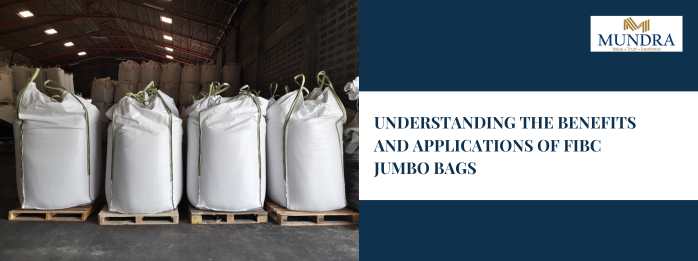FIBC Jumbo Bags, also known as Flexible Intermediate Bulk Containers, are large, robust bags designed for storing and transporting a wide range of materials. With their impressive capacity and strength, these bags have become essential in various industries. This article aims to provide an overview of FIBC Jumbo Bags, highlighting their benefits and applications.
What are FIBC Jumbo Bags?
FIBC Jumbo Bags are specialized containers made from woven polypropylene fabric. They typically feature lifting loops for easy handling and transportation. These bags are available in different shapes and sizes, allowing for customized solutions to specific storage and transportation needs.
When it comes to FIBC Jumbo Bags, their versatility is truly remarkable. Not only are they used for storing and transporting various materials, but they also play a crucial role in maintaining the quality and integrity of the contents. The woven polypropylene fabric provides durability and protection against external elements, ensuring that the materials inside remain safe and secure.
The Basics of FIBC Jumbo Bags
FIBC Jumbo Bags are designed to safely hold and transport large volumes of materials, ranging from powders and granules to chemicals and construction materials. They are commonly used for products such as sand, gravel, fertilizers, food grains, and plastic resins. The ability to hold up to several thousand pounds of material makes them an efficient and reliable solution.
Moreover, the design of FIBC Jumbo Bags incorporates features like spouts for easy filling and discharge, as well as liners for moisture protection. These additional elements enhance the functionality of the bags, making them indispensable in various industries such as agriculture, construction, and manufacturing.
Different Types of FIBC Jumbo Bags
There are several types of FIBC Jumbo Bags available, each designed to meet specific requirements. Some common variations include standard FIBC bags, conductive FIBC bags for handling materials that are sensitive to electrostatic charges, and hazardous material FIBC bags for transporting dangerous substances. The choice of the bag depends on the nature of the material being stored or transported.
Furthermore, specialized FIBC Jumbo Bags are equipped with features like sift-proof seams to prevent leakage and dust contamination, as well as UV protection for outdoor storage. These tailored options ensure that the bags not only meet but exceed the demands of various industries, providing a reliable and cost-effective solution for bulk material handling.
The Advantages of Using FIBC Jumbo Bags
Using FIBC Jumbo Bags offers numerous advantages that contribute to their widespread adoption in various industries.
When it comes to transporting and storing bulk materials, FIBC Jumbo Bags stand out as a cost-effective solution that brings multiple benefits to the table. These bags are not only efficient in terms of space utilization but also excel in reducing the overall packaging costs. By opting for FIBC Jumbo Bags, companies can streamline their logistics operations and achieve significant savings in the long run.
Cost-Effectiveness of FIBC Jumbo Bags
FIBC Jumbo Bags provide a cost-effective storage and transportation solution. Their large capacity allows for efficient use of space, reducing the need for multiple smaller containers. Additionally, the reusability of these bags minimizes the need for constant replacements, further cutting down costs.
Moreover, the eco-friendly nature of FIBC Jumbo Bags adds another layer of cost-effectiveness. By opting for reusable packaging solutions like these bags, businesses can actively contribute to sustainability efforts and reduce their carbon footprint.
Durability and Strength of FIBC Jumbo Bags
One of the key benefits of FIBC Jumbo Bags is their exceptional durability and strength. The woven polypropylene material used in their construction ensures resistance to tears, punctures, and abrasions. This strength enables the bags to withstand the rigors of handling, stacking, and transportation.
Furthermore, the durability of FIBC Jumbo Bags translates into enhanced product protection during transit and storage. Whether it’s sharp-edged materials or heavy loads, these bags offer reliable containment that ensures the integrity of the contents throughout the supply chain.
Versatility of FIBC Jumbo Bags
FIBC Jumbo Bags are highly versatile and can accommodate different handling methods and storage conditions. They can be designed with features such as filling and discharging spouts, liners for moisture protection, and UV stabilizers for outdoor storage. This flexibility allows for seamless integration into various industries and applications.
Additionally, the customizable nature of FIBC Jumbo Bags opens up a world of possibilities for tailored solutions. From specific sizing requirements to specialized features, these bags can be adapted to meet the unique needs of different products and industries, making them a versatile packaging choice for a wide range of applications.
Practical Applications of FIBC Jumbo Bags
Given their versatility, FIBC Jumbo Bags have found applications in several industries.
Originally designed for bulk transportation and storage, FIBC Jumbo Bags have evolved to cater to diverse industries due to their adaptability and cost-effectiveness. Let’s delve deeper into some lesser-known applications of these bags.
FIBC Jumbo Bags in the Agricultural Industry
In the agricultural sector, FIBC Jumbo Bags are widely used for storing and transporting crops, animal feed, and fertilizers. Their large capacity ensures efficient handling of grains, seeds, and other agricultural products, while protecting them from moisture, pests, and contamination.
Moreover, FIBC Jumbo Bags are also utilized for flood control in agricultural areas prone to inundation. These bags can be filled with sand or soil to create barriers, protecting crops and properties from flood damage.
FIBC Jumbo Bags in the Construction Sector
In construction, FIBC Jumbo Bags play a vital role in handling and transporting materials such as sand, gravel, and cement. Their robust construction and ability to withstand heavy loads make them ideal for use on construction sites, ensuring a reliable and efficient supply chain.
Furthermore, construction companies often repurpose used FIBC Jumbo Bags as temporary flood barriers or erosion control measures on construction sites located near water bodies or in areas prone to soil erosion.
FIBC Jumbo Bags in Waste Management
Waste management facilities utilize FIBC Jumbo Bags to safely handle and transport various types of waste, including recyclable materials and hazardous waste. These bags make waste disposal more manageable, minimizing the risk of spillage or contamination during transportation.
Additionally, FIBC Jumbo Bags are increasingly being used in waste-to-energy plants to store and transport biomass materials such as wood chips, sawdust, and agricultural residues. The bags’ durability and ease of handling make them a convenient choice for this eco-friendly energy production process.
Safety Measures for Using FIBC Jumbo Bags
While FIBC Jumbo Bags offer practical benefits, it is crucial to follow safety guidelines to ensure their safe handling and use.
Ensuring the safe handling and use of FIBC Jumbo Bags is paramount in various industries where these large bags are utilized for transporting and storing bulk materials. Implementing proper safety measures not only protects the integrity of the bags but also safeguards the well-being of workers and maintains operational efficiency.
Proper Handling of FIBC Jumbo Bags
It is essential to train personnel in the correct method of handling FIBC Jumbo Bags. This includes proper lifting techniques, ensuring the bags are not overloaded, and preventing damage during transportation. Adhering to these guidelines minimizes the risk of accidents and injuries.
Moreover, conducting regular inspections of the FIBC Jumbo Bags for any signs of wear and tear is crucial in maintaining their structural integrity. By identifying and addressing potential issues early on, the bags can be used safely multiple times, reducing the need for frequent replacements and minimizing costs.
Storage Guidelines for FIBC Jumbo Bags
When storing FIBC Jumbo Bags, it is important to consider factors such as moisture and exposure to direct sunlight. Bags with UV stabilizers are recommended for outdoor storage, while utilizing a dry and well-ventilated space indoors can help preserve bag integrity over time. Following these guidelines ensures the bags remain in optimal condition for reuse.
Additionally, segregating FIBC Jumbo Bags based on their designated use or contents can prevent cross-contamination and ensure compliance with industry regulations. Proper labeling and storage practices contribute to a more organized and efficient warehouse or storage facility, streamlining operations and enhancing overall safety protocols.
Purchasing and Recycling FIBC Jumbo Bags
When considering the purchase or disposal of FIBC Jumbo Bags, certain factors should be taken into account.
What to Consider When Buying FIBC Jumbo Bags
Before purchasing FIBC Jumbo Bags, it is crucial to assess the specific requirements of your application. Factors such as bag size, lifting capacity, and additional features should be considered to ensure compatibility and maximize operational efficiency.
Additionally, it is essential to evaluate the quality of the materials used in the construction of the FIBC Jumbo Bags. High-quality materials will ensure the bags can withstand the intended load capacity and environmental conditions, reducing the risk of damage or product loss during transportation or storage. Moreover, considering the certification and compliance of the bags with industry standards can guarantee their safety and reliability for use in various applications.
The Process of Recycling FIBC Jumbo Bags
FIBC Jumbo Bags can be recycled, contributing to a sustainable waste management approach. Recycling involves collecting used bags, cleaning them thoroughly, and processing them into plastic pellets that can be used in the production of new plastic items. This recycling process minimizes waste and reduces environmental impact.
Furthermore, engaging in a closed-loop recycling system for FIBC Jumbo Bags can enhance sustainability efforts. By partnering with recycling facilities or suppliers that offer take-back programs, businesses can ensure that their used bags are properly recycled and reintegrated into the production cycle. This closed-loop approach promotes circular economy principles, where resources are reused efficiently, reducing the demand for virgin materials and minimizing waste generation.
In conclusion, FIBC Jumbo Bags offer numerous benefits and find diverse applications in various industries. Their cost-effectiveness, durability, and versatility make them a reliable solution for storing and transporting various materials. By following safety guidelines and considering factors like sizing and recycling, businesses can fully utilize the benefits of FIBC Jumbo Bags while minimizing their environmental footprint.

